Key takeaways:
- Community workshops promote collaboration and relationship-building, fostering a sense of belonging among participants.
- Engaging community input ensures that project solutions reflect real needs, empowering residents to advocate for their neighborhoods.
- Creating a welcoming atmosphere and tailoring agendas to community interests enhances participation and engagement during workshops.
- The future of community workshops is leaning towards hybrid models and interactive tools, focusing on sustainability and resilience in community development.
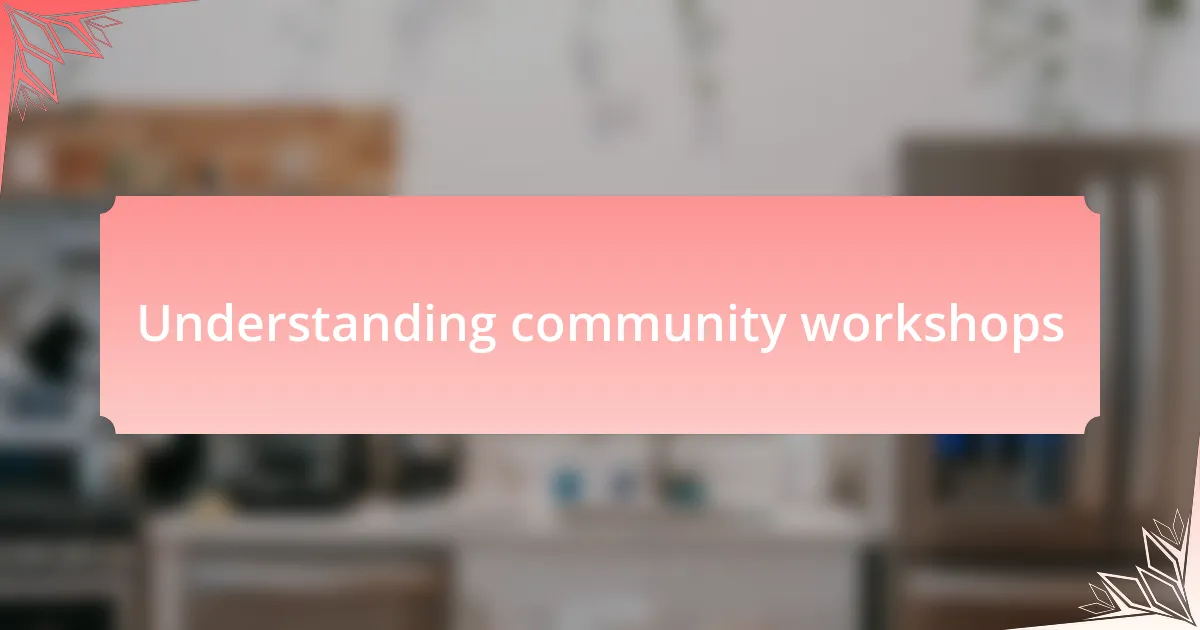
Understanding community workshops
Community workshops are essential gatherings where individuals come together to share ideas, learn skills, and address local issues collaboratively. I recall attending a workshop in my neighborhood that focused on sustainable living. It was inspiring to see people from different walks of life excitedly exchanging tips on composting and gardening—there’s something truly special about a shared mission.
These workshops often facilitate a deep connection among participants, fostering relationships that extend beyond the initial gathering. Have you ever noticed how a common purpose can bring people together? I remember how after a few sessions, we not only tackled local environmental concerns but also built friendships that enriched our lives. The emotional bonds formed during these workshops are just as vital as the tangible outcomes.
By understanding community workshops, we unlock the potential for meaningful change in our neighborhoods. They are not just about teaching and learning; they are about creating a sense of belonging and shared responsibility. Reflecting on my journey, I often think, how can we harness the power of these gatherings to address the pressing challenges we face? Each workshop offers a unique opportunity to inspire and be inspired, reminding us of the collective strength within our communities.
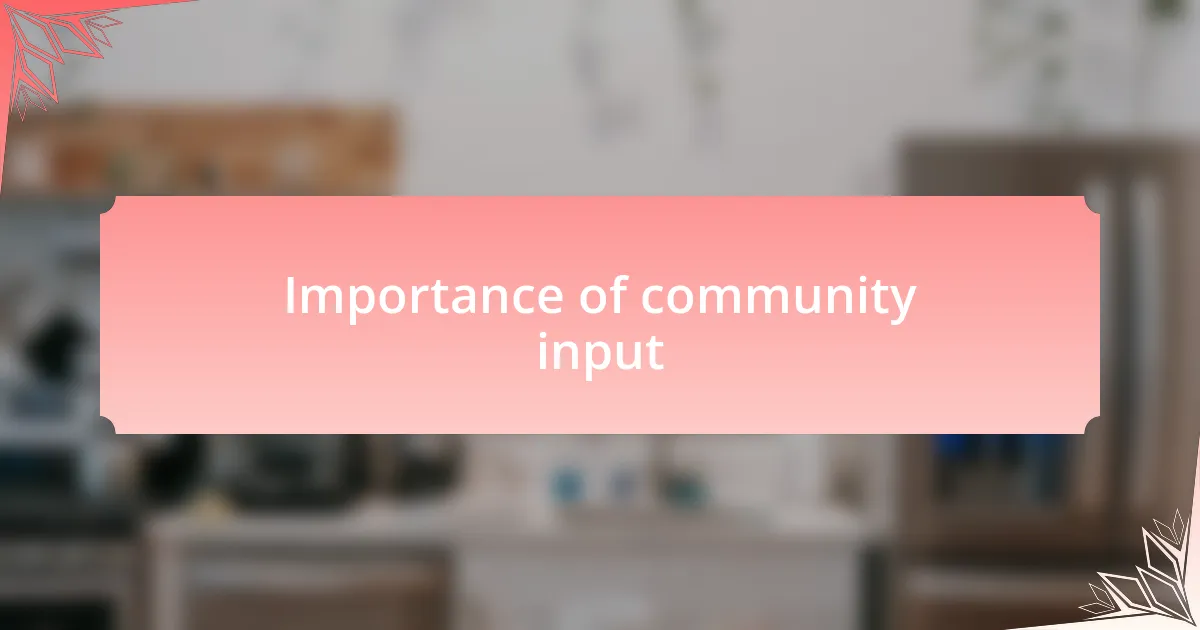
Importance of community input
Engaging the community in any project is crucial. From my experience in community housing developments, I’ve seen firsthand how input from residents shapes not only the design but also the functionality of a space. I remember sitting in a planning meeting where a long-time resident shared her views on accessibility. Her suggestions were not just valuable; they were transformative, leading to designs that truly accommodated everyone’s needs.
When community members voice their thoughts, it creates a sense of ownership. It’s empowering to watch participants become passionate advocates for their neighborhoods. I think back to a workshop where a young parent raised concerns about safe play areas for kids. That discussion sparked a collective initiative, and eventually, we established new, safe spaces that benefit families throughout our community. Isn’t it amazing how one voice can ignite a widespread change?
Collective input ensures that the solutions we develop reflect real needs rather than assumptions. Reflecting on my role in these workshops, I often find myself wondering how we can dig deeper into the unique experiences of residents. Sometimes, it’s the quieter voices that hold the most insightful perspectives, reminding me of the invaluable wisdom embedded in lived experiences. Engaging with the community not only leads to better outcomes but also fosters trust and collaboration that can last for years to come.
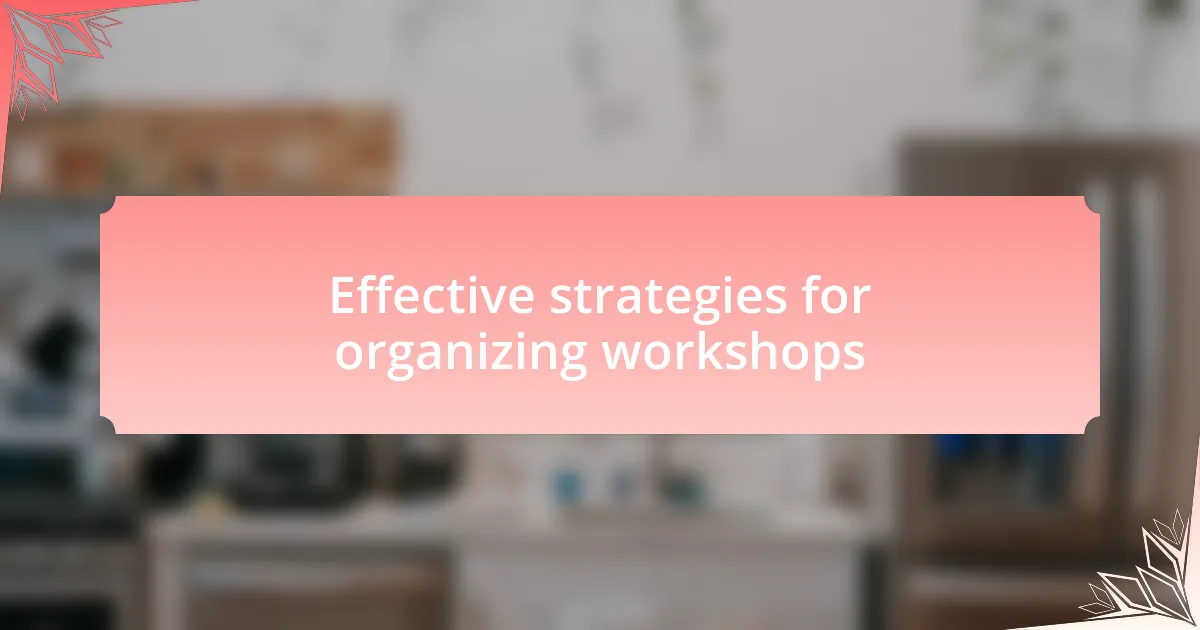
Effective strategies for organizing workshops
One effective strategy I’ve found crucial in organizing workshops is to create a welcoming atmosphere. I once participated in a workshop where the organizers made a great effort to decorate the space and provide refreshments. It seemed like a small detail, but this thoughtful approach broke down barriers, encouraging participants to engage openly. Have you ever noticed how a warm environment can transform the mood? In my experience, it signals that their contributions are valued.
Another strategy that has proven successful is to tailor the agenda based on community interests and needs. In a recent workshop, I took the time to survey potential attendees beforehand. This allowed me to incorporate topics that resonated with them, making the session more relevant and engaging. I recall the excitement in the room when we dove into discussions that participants were eager to explore. Isn’t it rewarding when people feel their voices are the driving force behind the agenda?
Lastly, incorporating interactive elements can significantly enhance engagement during the workshop. For instance, I introduced small group discussions where attendees tackled specific issues and then shared their thoughts with everyone. I witnessed firsthand how this not only fostered collaboration but also sparked some of the most innovative solutions. Can you imagine how much richer our discussions became with this approach? It’s all about creating opportunities for participants to learn from each other, building a stronger sense of community in the process.
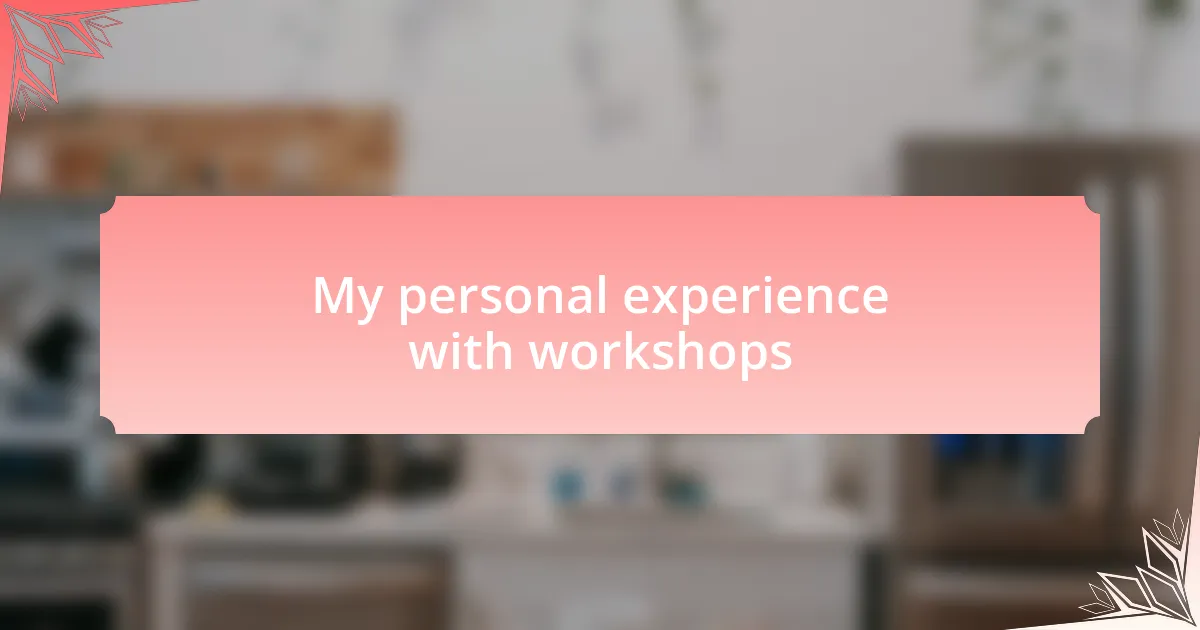
My personal experience with workshops
In my journey with community workshops, I’ve encountered an array of diverse experiences. I remember attending a workshop focused on sustainable housing, where we actually got our hands dirty with small DIY projects. It was exhilarating to see how practical knowledge transformed into something tangible, creating a genuine sense of accomplishment among participants. Who would have guessed that a little hands-on work could foster such camaraderie?
There was another workshop I attended where we were encouraged to share our personal stories related to housing challenges. It was a vulnerable moment for many of us, but I was struck by how those shared experiences created a profound connection. Listening to others, I realized that we all faced unique struggles, yet many echoed my own feelings of frustration and hope. Have you ever felt that rush of understanding when someone hits the nail on the head about your own experience?
Sometimes, I find that the best insights come from the most unexpected places. During one workshop, I was seated next to a retiree who had once worked in urban planning. While discussing zoning laws, he shared fascinating anecdotes from his career that not only enriched our conversation but opened my eyes to implications I had never fully considered. Have you ever learned something new simply because of who you were sitting next to? It’s moments like these that remind me of the incredible value in gathering diverse voices and perspectives.
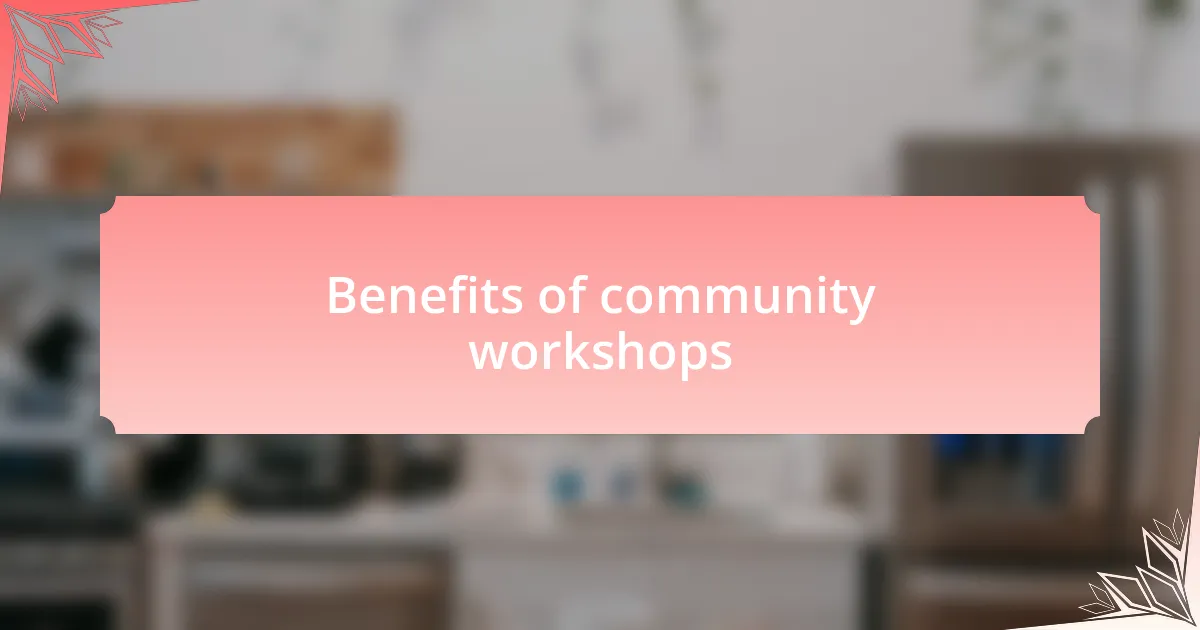
Benefits of community workshops
Participating in community workshops fosters a strong sense of belonging among members. I recall one workshop where we collectively brainstormed ideas for a community garden. It was fascinating to watch as different perspectives blended together to create a shared vision. Can you imagine the sense of pride that comes from seeing something you helped shape grow and flourish?
Another significant benefit lies in skill development. At a workshop I attended focused on home repairs, I discovered how to patch drywall and change a faucet. I remember the feeling of empowerment as I completed these tasks, realizing I could tackle home maintenance challenges that once seemed daunting. Isn’t it amazing how learning practical skills can boost our confidence and independence?
Moreover, these workshops often serve as a platform for amplifying voices that might otherwise go unheard. I once attended a session where local residents shared their concerns about housing policies. Hearing their stories was not only eye-opening but also motivated many of us to advocate for change in our community. Have you ever felt that spark of motivation when someone else’s story resonates with your own? It’s moments like these that unite us for a common cause and channel our collective energy towards positive change.
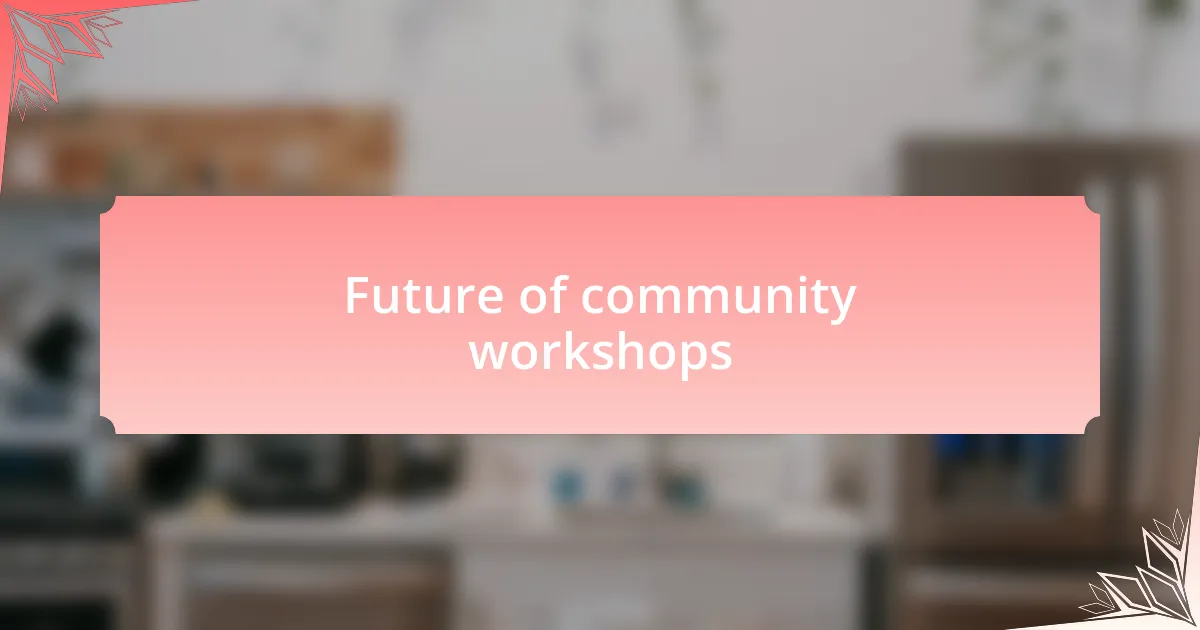
Future of community workshops
As I look towards the future of community workshops, I see a growing trend toward hybrid models that blend in-person engagement with digital platforms. I recall a recent neighborhood brainstorming session conducted on a virtual platform, where participation actually soared beyond our usual in-person attendance. Isn’t it interesting how technology can bridge gaps and bring more voices into the fold?
In addition, I am optimistic about the incorporation of interactive tools in these workshops. For instance, imagine using apps that allow real-time feedback during discussions. I participated in a workshop where we used one such app to rank ideas on community projects, and it was exciting to see instant results. Don’t you think this approach not only fosters collaboration but also makes discussions more dynamic and engaging?
Looking ahead, I believe workshops will increasingly focus on sustainability and resilience in community development. A few months ago, I attended a session where we crafted eco-friendly living solutions for our neighborhoods. It felt invigorating to brainstorm ideas that could lead to more sustainable living environments. How can we not be excited about creating a legacy that prioritizes the health of our planet?